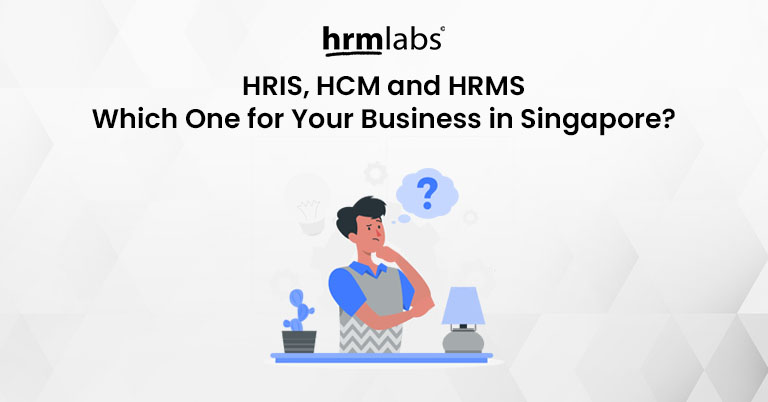The world of HR technology can be a confusing one, especially when acronyms like HRIS, HCM, and HRMS get thrown around. As a business owner or HR professional in Singapore, navigating these options and choosing the right system for your company can feel overwhelming.
This article clarifies the differences between these systems and helps you choose the best fit based on your industry, size, and specific challenges.
HRIS (Human Resource Information System)
Think of an HRIS as the foundational layer of HR technology. It’s a database management system specifically designed to store and organize crucial employee data, like contact information, payroll details, leave entitlements, and performance records.
Benefits of using an HRIS
- Improved data accuracy and accessibility: Eliminate manual data entry and ensure all employee information is centralized in one secure location.
- Enhanced administrative efficiency: Automate routine tasks like leave requests and payroll processing, freeing up HR professionals for more strategic work.
- Simplified compliance: HRIS systems can help ensure adherence to labor regulations and simplify processes like CPF contributions and leave calculations.
Limitations of an HRIS
Limited functionality: HRIS systems typically focus on data management and core HR processes. They may not offer features like talent management or advanced analytics.
Scalability concerns: Some basic HRIS solutions might struggle to accommodate the needs of a rapidly growing company.
Ideal for
Small and medium-sized businesses (SMBs) with basic HR needs focused on data management and administrative efficiency.
Example: A small cafe chain in Singapore needing to manage staff records and payroll.
HRMS (Human Resource Management System)
The term HRMS can sometimes be used interchangeably with HRIS or HCM. However, traditionally, HRMS refers to a more integrated HR solution that combines HR functionalities with other enterprise systems like payroll, finance, or customer relationship management (CRM).
Benefits of using an HRMS
- Streamlined workflows: Data flows seamlessly between different systems, eliminating data silos and manual processes.
- Improved operational efficiency: HRMS systems can automate workflows across departments, enhancing overall business efficiency.
- Enhanced employee experience: Employees can access a single platform for managing their personal information, requesting leave, and accessing company resources.
Limitations of an HRMS
- Complexity: Implementing and integrating an HRMS can be a complex process requiring significant IT expertise.
- Cost: HRMS solutions are typically the most expensive option due to their extensive functionalities and potential customization requirements.
- Scalability: Not all HRMS solutions scale perfectly for smaller businesses. Ensure the system caters to your current and projected needs.
Ideal for
Large enterprises with complex HR requirements, diverse departments, and a need for integrated data across various business functions.
HCM (Human Capital Management)
HCM takes things a step further. It’s a comprehensive suite of HR applications that goes beyond data management to encompass the entire employee lifecycle. An HCM system typically includes all the functionalities of an HRIS, plus additional features such as:
- Recruitment and onboarding: Streamline the hiring process with applicant tracking, interview scheduling, and new hire onboarding tools.
- Talent management: Identify and develop high potential employees through performance management, skills assessments, and succession planning.
- Learning and development: Provide employees with access to training courses, learning materials, and career development opportunities.
- Payroll and benefits administration: Manage payroll processing, employee benefits enrollment, and tax calculations efficiently.
- Advanced analytics and reporting: Gain valuable insights into workforce trends, employee engagement, and performance metrics.
Benefits of using an HCM system
- Holistic view of your workforce: HCM systems provide a centralized platform for managing all aspects of the employee experience, from recruitment to retirement.
- Improved talent management: Attract, retain, and develop top talent with a comprehensive set of features designed to optimize the employee lifecycle.
- Strategic decision-making: Data-driven insights from HCM systems can help you make informed decisions about talent acquisition, development, and workforce planning.
Limitations of an HCM system
- Cost: HCM systems can be more expensive than HRIS solutions due to their broader range of functionalities.
- Implementation complexity: Implementing a comprehensive HCM system can require a significant investment in time and resources.
Ideal for
Medium to large-sized businesses with a growing workforce and a strategic focus on talent management and data-driven decision making.
Choosing the Right HR System for Your Needs
Now that you understand the core differences between HRIS, HCM, and HRMS, the next step is to identify the system that best aligns with your specific needs. Here are some key factors to consider:
- Company size and stage of growth: SMBs might benefit most from an HRIS, while larger companies with complex talent management needs may prefer an HCM system.
- Industry and specific HR challenges: Some industries like healthcare or finance might have specific regulatory requirements that influence your choice.
- Budget: HRIS solutions are typically more affordable, while HCM and HRMS come with a higher price tag.
- Scalability: Choose a system that can adapt to your company’s growth and evolving needs.
- Integration needs: If you use other enterprise software, consider the level of integration an HRMS can offer.
Conclusion
Understanding the differences between HRIS, HCM, and HRMS is crucial for selecting the right HR software for your business. Each system offers unique features and benefits tailored to different business needs and scales. By assessing your specific requirements, industry challenges, and budget, you can choose the most suitable system to enhance your HR operations.
HRMLabs is a versatile HRMS solution designed to meet all your HR needs. It offers a comprehensive suite that integrates various HR management features, from efficient payroll processing to strategic talent management and robust compliance capabilities. HRMLabs is adaptable to businesses of any size, ensuring it meets your specific requirements. Its flexibility and wide range of functionalities make HRMLabs a cost-effective solution for managing your HR operations seamlessly and efficiently.



